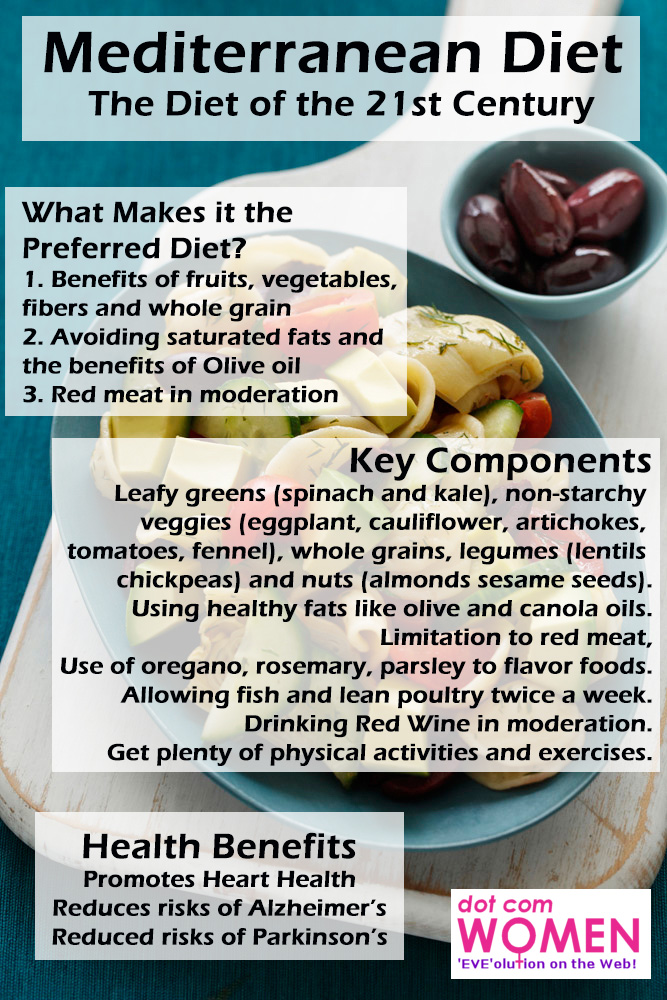Mediterranean Diet – The Diet of the 21st Century
We all have heard of the Mediterranean Diet and its and its many benefits. But how many of us understand the science behind it? A diet constituting of plant based foods, fats that are healthy and whole grains are recommended by nutritionists and health advisers all over the world.

What Makes it the Preferred Diet?
While there are a multiple reason why the Mediterranean Diet is a preferred diet plan and a healthy option, there are few aspects that makes it stand out from other diets:
- The benefits of fruits, vegetables, fibers and whole grain the Mediterranean Diet
The major aspect of a Mediterranean Diet refers regular consumption of vegetable and fresh fruits. It is widely advised by experts to have at least 5 to 6 servings of fresh fruits and vegetables on daily basis. Fruits and vegetables are enriched with many essential vitamins and minerals as well as antioxidants that are important and crucial for good health.
- Avoiding saturated fats and the benefits of Olive oil
This diet is inherently low in saturated fat, but the olive oil in it makes it high in monounsaturated fat, which is good for heart health. Olive oil is also a rich source of antioxidants including vitamin E.
- Red meat in moderation
A very little quantity of red meat in included in the Mediterranean diet. When it comes to eating meats the diet allows very little or moderate amounts of lean poultry and fish. This results in the body having more of good cholesterol and less of bad cholesterol. Also, adding lean poultry and fish allows the dieter to have enough antioxidants that are found in them.
Below are the key components of the Mediterranean Diet:
- Plant based foods, like fruits, vegetables (leafy greens like spinach and kale, non-starchy veggies like eggplant, cauliflower, artichokes, tomatoes and fennel), whole grains, legumes (lentils and chickpeas) and nuts (almonds and sesame seeds).
- Using healthy fats like olive and canola oils.
- Limitation to red meat,
- Use of herbs and spices (oregano, rosemary and parsley) instead of salt as to flavor foods.
- Allowing fish and lean poultry twice a week.
- Drinking Red Wine in moderate amount and this is optional.
- Get plenty of physical activities and exercises.
Health Benefits of a Mediterranean Diet
The numerous health benefits of a Mediterranean Diet are hard to count but still a few have been summed up for you:
- Promotes Heart Health: the diet has proven to reduce the risks of cardiovascular diseases. The foods in the diet helps in keeping the cardiovascular system healthy and strong.
- Reduces risks of developing Alzheimer’s disease: improved cholesterol, blood sugar levels, and the overall health of your blood vessels are the benefits of the diet. Together these work to reduce your risk of developing dementia or Alzheimer’s disease.
- Reduced risks of developing Parkinson’s disease: with all the healthy antioxidants in fruits and vegetables, keeps the cells from undergoing the process of oxidative stress, responsible for high amounts of damage and contributing to the development of degenerative diseases like Parkinson’s.
 About the Author:
About the Author:
Sheela Seharawat – Dietician and Founder Member – Diet Clinic
With the motto of ‘Let Your Diet Work for You’, Sheela aims to spread the message of wellness and the art of dieting through her clinics across various parts of the globe.
Pin it for Later Reference




